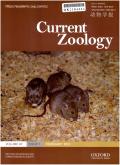适应环境变化的速度与条件有关吗?用家鼠进行的实验
IF 2
2区 生物学
Q2 ZOOLOGY
引用次数: 0
摘要
环境条件在不断变化,有的是人为干扰,有的是跨时空的自然变化。行为的改变往往是对条件变化的第一反应。行为的灵活性有可能提高生物的生存和繁殖机会。目前,我们对这种行为调整所需的时间尺度、它们对繁殖和生存的实际影响以及行为调整是否足以跟上不断变化的条件缺乏了解。我们利用家鼠(Mus musculus)来测试性格和生活史特征是否能在成年期灵活适应实验诱导的食物转换,或通过代际可塑性(即只有在后代中才能看到调整)进行调整。小鼠在六个半自然环境的实验种群中生活了四代,要么吃高质量食物,要么吃标准质量食物。我们以前的研究表明,优质食物能使小鼠的体质更好,性格更不容易冒险。在这里,我们测试了调整的速度和/或幅度是否与条件有关,以及调整是否会对适应性产生影响。生命史特征(而非性格特征)对食物转换的反应是灵活的,主要是直接减少繁殖和减缓生长。与各自的对照组相比,父母接受食物转换的后代会发展出更积极的压力应对性格,体重增长速度也更慢。此外,大多数性状的调节都是条件依赖性的,之前喂食优质食物的动物表现出更强的反应。我们的研究强调了生命史和性格特征对环境变化的调整速度不同,从而突出了环境和反应模式对进化模型的重要性。本文章由计算机程序翻译,如有差异,请以英文原文为准。
Is the speed of adjusting to environmental change condition dependent? An experiment with house mice (Mus musculus)
Environmental conditions change constantly either by anthropogenic perturbation or naturally across space and time. Often, a change in behaviour is the first response to changing conditions. Behavioural flexibility can potentially improve an organism’s chances to survive and reproduce. Currently, we lack an understanding on the time-scale such behavioural adjustments need, how they actually affect reproduction and survival and whether behavioural adjustments are sufficient in keeping up with changing conditions. We used house mice (Mus musculus) to test whether personality and life-history traits can adjust to an experimentally induced food-switch flexibly in adulthood or by intergenerational plasticity, i.e., adjustments only becoming visible in the offspring generation. Mice lived in six experimental populations of semi-natural environments either on high or standard quality food for four generations. We showed previously that high-quality food induced better condition and a less risk-prone personality. Here, we tested whether the speed and/ or magnitude of adjustment shows condition-dependency and whether adjustments incur fitness effects. Life-history but not personality traits reacted flexibly to a food-switch, primarily by a direct reduction of reproduction and slowed-down growth. Offspring whose parents received a food-switch developed a more active stress-coping personality and gained weight at a slower rate compared to their respective controls. Furthermore, the modulation of most traits was condition-dependent, with animals previously fed with high-quality food showing stronger responses. Our study highlights that life-history and personality traits adjust at different speed towards environmental change, thus, highlighting the importance of the environment and the mode of response for evolutionary models.
求助全文
通过发布文献求助,成功后即可免费获取论文全文。
去求助
来源期刊

Current Zoology
Agricultural and Biological Sciences-Animal Science and Zoology
CiteScore
3.20
自引率
9.10%
发文量
111
审稿时长
6 weeks
期刊介绍:
About the Journal
Current Zoology (formerly Acta Zoologica Sinica, founded in 1935) is an open access, bimonthly, peer-reviewed international journal of zoology. It publishes review articles and research papers in the fields of ecology, evolution and behaviour.
Current Zoology is sponsored by Institute of Zoology, Chinese Academy of Sciences, along with the China Zoological Society.
 求助内容:
求助内容: 应助结果提醒方式:
应助结果提醒方式:


